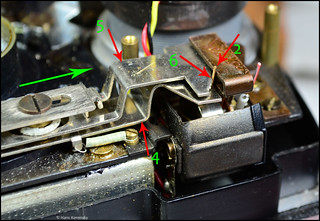Difference between revisions of "Trapped needle"
(Short glossary item) |
Hanskerensky (talk | contribs) (/photos/29504544@N08/13911968616 added from pool) |
||
| Line 1: | Line 1: | ||
{{glossary}} | {{glossary}} | ||
| + | {{Flickr_image | ||
| + | |image_source= http://www.flickr.com/photos/29504544@N08/13911968616/in/pool-camerawiki/ | ||
| + | |image= http://farm8.staticflickr.com/7376/13911968616_1b482ed475_n.jpg | ||
| + | |image_align= right | ||
| + | |image_text= Trapped Needle Exposure System <br/> Yashica-E | ||
| + | |image_by= Hans Kerensky | ||
| + | |image_rights= with permission | ||
| + | }} | ||
A '''trapped-needle''' exposure system is used in several popular cameras (examples include the [[Olympus Trip 35]], the [[Paxina Electromatic]], and one model of the [[Mansfield Skylark]]). It is one mechanism by which auto-exposure can be achieved using a [[selenium meter]].<ref>The trapped-needle system is not the only way to achieve this; the Agfa [[Automatic 66]] uses a different mechanism, part-electrical and part-pneumatic.</ref> The voltage of the selenium cell deflects the needle of a galvanometer. The lens aperture, often formed by just two shaped blades, is spring-loaded so that when the shutter-release is pressed, it begins to close (or in some versions of the mechanism, begins to open). The needle of the galvanometer obstructs this motion (this may be achieved, for example, by one blade of the aperture having a stepped metal plate attached to it, which projects up toward the meter needle), so that the light value determines the aperture. | A '''trapped-needle''' exposure system is used in several popular cameras (examples include the [[Olympus Trip 35]], the [[Paxina Electromatic]], and one model of the [[Mansfield Skylark]]). It is one mechanism by which auto-exposure can be achieved using a [[selenium meter]].<ref>The trapped-needle system is not the only way to achieve this; the Agfa [[Automatic 66]] uses a different mechanism, part-electrical and part-pneumatic.</ref> The voltage of the selenium cell deflects the needle of a galvanometer. The lens aperture, often formed by just two shaped blades, is spring-loaded so that when the shutter-release is pressed, it begins to close (or in some versions of the mechanism, begins to open). The needle of the galvanometer obstructs this motion (this may be achieved, for example, by one blade of the aperture having a stepped metal plate attached to it, which projects up toward the meter needle), so that the light value determines the aperture. | ||
Latest revision as of 05:37, 29 June 2015

|
| Trapped Needle Exposure System Yashica-E image by Hans Kerensky (Image rights) |
A trapped-needle exposure system is used in several popular cameras (examples include the Olympus Trip 35, the Paxina Electromatic, and one model of the Mansfield Skylark). It is one mechanism by which auto-exposure can be achieved using a selenium meter.[1] The voltage of the selenium cell deflects the needle of a galvanometer. The lens aperture, often formed by just two shaped blades, is spring-loaded so that when the shutter-release is pressed, it begins to close (or in some versions of the mechanism, begins to open). The needle of the galvanometer obstructs this motion (this may be achieved, for example, by one blade of the aperture having a stepped metal plate attached to it, which projects up toward the meter needle), so that the light value determines the aperture.
Notes
- ↑ The trapped-needle system is not the only way to achieve this; the Agfa Automatic 66 uses a different mechanism, part-electrical and part-pneumatic.